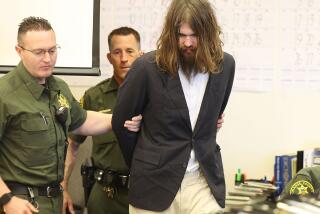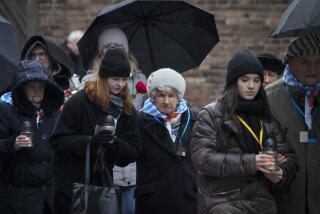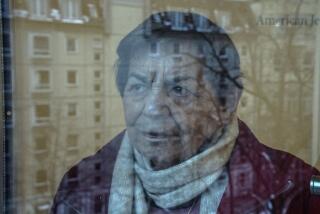Rudolf Brazda dies at 98; survivor of Nazis’ persecution of gays
Reporting from Paris -- Rudolf Brazda, one of the last known survivors of Nazi Germany’s persecution of gays who later called his three years in a concentration camp a descent into hell, has died. He was 98.
A German gay rights group said Brazda died Wednesday, but it did not provide details.
Brazda was among thousands of gay men deported to the death camps during World War II because of their sexual orientation. Adolf Hitler’s Nazis saw homosexuals as an aberration and a threat to the Aryan race.
They were known as the “Pink Triangles” because of the pink triangle they were forced to wear on their clothes.
“After everything I have been through, I have no more fears,” Brazda said in an interview with German journalists two years ago.
Brazda was born in 1913 in Meuselwitz, Germany, the last of eight children to Czech parents who had emigrated to Saxony in the southeast, where his father worked in the coal mines.
As a young man, Brazda had wanted to work in the local gentlemen’s outfitters shop. When he failed to get an apprenticeship, he trained as a roofer.
In Germany in the early 1930s as the Weimar Republic came to an end, male homosexual acts were still outlawed under Paragraph 175 of the German Criminal Code. But there was a climate of relative tolerance in which Brazda lived openly, meeting other homosexuals and cohabiting with his partner in a room they sublet from a Jehovah’s Witness landlady.
Then the Nazis came to power and enforced the laws against homosexuality.
Brazda, who was arrested and eventually sent to Buchenwald, knew a prisoner’s hold on life in the camp was tenuous. One day, after giving an SS guard the wrong answer to a question, the guard attacked him, knocking out three teeth and ordering his execution. But another guard, who was infatuated with Brazda, stepped in to convince his superiors that Brazda was a vital worker, and he was given a reprieve.
“Others died, but I came through,” he would say later, recalling the horror of the camps.
When the Nazi regime collapsed and SS guards set off with prisoners on long marches, costing the lives of many, Brazda survived because a guard hid him for three weeks and gave him food. American troops liberated the camp April 11, 1945.
After the war, Brazda settled in Alsace, France, near the French-German border. He met his partner, Edi, in 1950, and they remained together until Edi’s death in 2002.
In 2008, when Brazda learned that a memorial was to be unveiled in Berlin to homosexual victims of Nazism, he made himself known. In April 2011, he was awarded the French Legion d’Honneur for promoting awareness of the deportation of homosexuals.
When he traveled to Germany to see his records from Buchenwald, Brazda noted that millions were broken by the Nazi regime.
“But they were never able to destroy me. I am not ashamed,” he said. “I have made my peace with the past.”
Willsher is a special correspondent.
More to Read
Start your day right
Sign up for Essential California for the L.A. Times biggest news, features and recommendations in your inbox six days a week.
You may occasionally receive promotional content from the Los Angeles Times.




















































